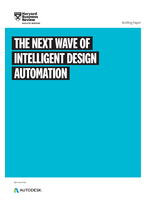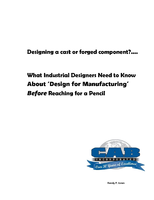AUTOMATICA 2012 to address automation in service of health.
Share:
Press Release Summary:
Scheduled for May 22-25, AUTOMATICA 2012 will provide overview of how robots, assembly systems, machine vision, and automation components are used in medical, pharmaceutical, and cosmetic industries. Some topics include Laboratory and Production Automation in the Pharmaceuticals Industry; Biotech: The Next Big Innovation Wave Will Peter Out without Automation; 3D-Vision and Intelligent Gripper Technology Used in Food Packaging; and Modular Installation in Medical and Pharmaceutical Industry.
Original Press Release:
AUTOMATICA 2012 Shows Solutions for the Medical, Pharmaceuticals and Cosmetics Industries
Munich. Automation is advancing rapidly in medical engineering. The reason is that assembly and handling technology, robotics and machine vision provide considerable advantages for these innovative industries with respect to productivity, precision and quality. Visitors to AUTOMATICA 2012, which will take place on the grounds of the New Munich Trade Fair Centre from 22 until 25 May 2011, will obtain an overview of how robots, assembly systems and machine vision as well as numerous automation components are used in the service of health.
Automation technology is being used increasingly in the medical, pharmaceuticals and cosmetics industries. It is helping these innovative industries to launch products on the market more quickly and achieve more economic production. Robot manufactures and other automation providers have been concentrating on the multifaceted needs of these industries for years. They can provide sophisticated technologies today. On one hand, they provide multiaxle robot solutions for grinding and polishing of implants. On the other hand, they also provide simpler but usually highly precise automation units. Corresponding sensors, grippers and vision systems are also available, which visitors to AUTOMATICA 2012 can see for themselves on site.
Engineer Dr. Andreas Pot, Group Leader of Intralogistics at the Fraunhofer Institute for Production Technology and Automation (IPA) in Stuttgart, confirmed the availability of suitable robots and automation components for use in the medical, pharmaceuticals and cosmetics industries. He distinguishes two kinds of requirements, which must be fulfilled depending on use. "Many robots must be suitable for production-related use under clean room conditions, in other words, strict guidelines with respect to materials used and particles released. Strict hygiene requirements apply to other uses, such as we know from the foodstuffs industry. These are both no problem for robot technology. Many companies provide especially designed models, which can also be certified correspondingly."
Flexible Robots for Pick & Place Tasks
The number of robots used in the medical, pharmaceuticals and cosmetics industries is increasing rapidly. Robot solutions, which are used in operation theatres and directly on patients, require extremely sophisticated technology. However, these uses play a subordinate role with respect to robot figures, because these are mainly special solutions. Most robots are used in standard applications. It is usually a matter of automation solutions with pick & place tasks, whose main challenges are the highest possible number of picks per minute and increased flexibility. This requires extremely fast robots, usually reliable machine vision and integration of line tracking functions.
Delta robots - parallel kinematics with up to six axles - are an almost ideal solution for such pick & place tasks. They usually cannot handle very heavy loads, but they are extremely fast. To be able to use them especially flexibly, these robots are often equipped with additional vision systems. This enables controlled access to different objects. One robot manufacturer recently started offering delta robots with their own, pre-installed vision system that can even handle colour processing. As a result, differently coloured tablets can be placed precisely in packaging, for example.
Multifaceted use of machine vision systems
Industrial machine vision has become generally established in many medical and pharmaceutical areas. Progress has above all been achieved in colour processing and 3D vision, which opens up numerous new automation possibilities. For example, colour-processing vision systems are used in cytology or cytodiagnosis and pathology for tissue and carcinoma recognition. To detect complex structures such as cells and dendrites, however, reliable colour classification is required, which in turn requires high-performance image-processing software.
3D procedures have also achieved significant performance increases, which is making medical image analysis increasingly important. Using the light-slit method, for example, a drilled tooth can be scanned three dimensionally using a laser line, which produces a 3D module of the inlay to be produced. Then a robot precisely grinds the dental restoration based on this model.
In the pharmaceuticals industry, machine vision is primarily used for quality controls in manufacture of drugs. Its responsibilities include monitoring crystal growth and fill levels of ampoules. The colour of tablets and the absence of damage to blisters can also be checked using modern vision systems. There is even a suitable solution for package inserts and packaging with print image control (OCV).
Automatic assembling and inspecting for high quality
Assembly systems have already been making an important contribution to optimized productivity and quality for a long time in the manufacture of small medical engineering devices such as auto-injectors and inhalers. In addition to numerous improvements in details, a basic trend to modularly setup systems can be seen. This is primarily due to economic reasons, because the time-saving in obtaining approval with early process validation and consequently reduced time to market launch is enormous.
A prerequisite for this is a machine platform, which can be expanded from a pilot system to a high-performance production facility. A manual workstation with partially automated inspection and assembly operations can be constructed for a device still in the development stage, with which all critical process can already be qualified in their final configuration in this pilot system. These processes are then transferred 1:1 into a semiautomatic assembly line and finally into a completely automated further phase.
AUTOMATICA - Platform for automation in medical engineering
Regardless of whether robot manufacturer, vision system supplier or specialists assembly systems, approx. 1809 companies, which provide products for automation in the medical, pharmaceuticals and cosmetics industries, have already registered for AUTOMATICA 2012.
The AUTOMATICA Forum provides high quality talks for visitors from these industries. On 24 May 2012, automation topics in medical engineering will be dealt with under the motto "New industries in focus: food, medicine, pharmaceuticals and biotech" during the whole day. In the morning, there will be talks on the topics "Laboratory and Production Automation in the Pharmaceuticals Industry", "Biotech: The Next Big Innovation Wave Will Peter Out without Automation" and "3D-Vision and Intelligent Gripper Technology Used in Food Packaging". In the afternoon, trends in service and medical robotics will be presented, e.g., "The Sterile Robot: What Is the State of Technology and Want Do Users Want" and "Modular Installation in Medical and Pharmaceutical Industry". The panel discussions afterward will deal with the pharmaceutical and medical industries as well as foodstuffs as growth markets of robotics.
About AUTOMATICA
International Trade Fair for Automation and Mechatronics
AUTOMATICA is the first and only international trade fair, which covers all areas of robotics + automation every two years. It has taken place on the grounds of the New Munich Trade Fair Centre every two years since 2004. The aim of the fair is to present the entire value-added chain in robotics and automation. Messe München GmbH and VDMA Robotik + Automation, trade fair industry advisor, are behind the industry-driven concept of AUTOMATICA. Exhibitor and visitor statistics for AUTOMATICA are audited by an independent auditor for the order of the Gesellschaft zur Freiwilligen Kontrolle von Messe- und Ausstellungszahlen (Society for Voluntary Control of Fair and Exhibition Statistics) and internationally by UFI (Global Association of the Exhibition Industry).
About Messe München International (MMI)
Messe München International (MMI) is one of the world's leading trade-fair organisations with approximately 40 trade fairs for investment goods, consumer goods and new technologies. More than 30,000 exhibitors from more than 100 countries and over two million visitors from more than 200 countries take part each year in the trade fairs in Munich. In addition, MMI organizes trade fairs in Asia, Russia, the Middle East and South America. With six foreign affiliated companies in Europe and Asia as well as 64 foreign representatives covering more than 90 trade fair-relevant countries, MMI has a global network. As a company active globally, Messe München International makes a substantial contribution to environmental protection and sustainability. Additional information is available at www.messe-muenchen.de.
Contact person for the press:
AUTOMATICA
Claudia Huber - Press Officer of Messe München GmbH
Tel. (+49 89) 949 - 21471
Fax (+49 89) 949 - 97 21471
E-mail: claudia.huber@messe-muenchen.de
VDMA Robotik + Automation
Thilo Brodtmann, Managing Director, VDMA Robotics + Automation
Tel. (+49 69) 6603 - 1590
Fax (+49 69) 6603 - 2590
E-mail: thilo.brodtmann@vdma.org
www.vdma.org/r+a




